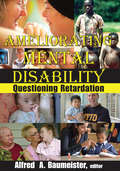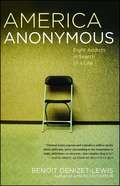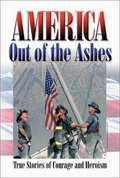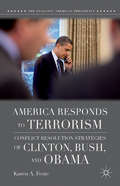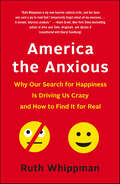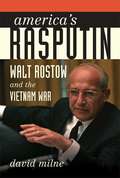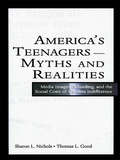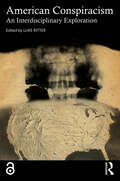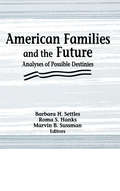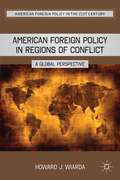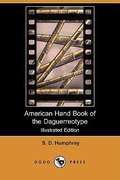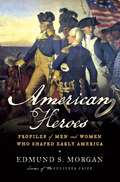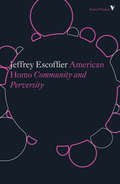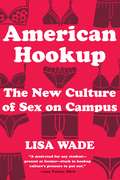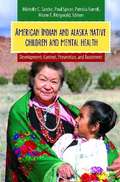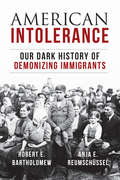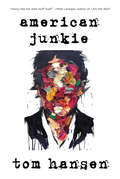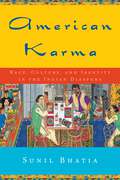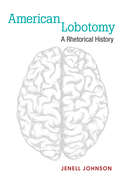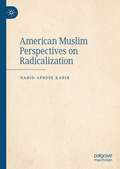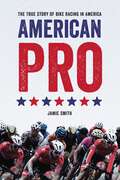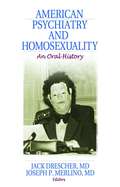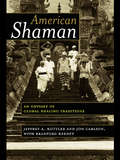- Table View
- List View
Ameliorating Mental Disability: Questioning Retardation
by Alfred A. BaumeisterThis book grows out of the optimistic view that mental retardation can be treated. It views mental retardation primarily as a behavioral problem. A child is diagnosed as retarded primarily because he behaves in certain maladaptive ways, not simply because he may have a chromosomal anomaly. The contributors view any intervention intended to produce adaptive changes in the behavior of the retarded as "treatment." The authors come from the fields of medicine, special education, and speech and hearing, as well as from psychology.The book is intended to help students and workers in the field apply research findings and theoretical formulations in their appraisal and treatment of mental retardation. The primary emphasis of the book is empirical. While many of the author's suggestions have not been subjected to rigorous experimental scrutiny, almost all have been derived from close examination of the research literature.A wide diversity of topics are included in this volume. Criteria employed were the relevance of the topic to the understanding and modifi cation of defective behavior; and the subject's popularity or neglect in other sources. Ameliorating Mental Disability will be of interest to medical officers in institutions for the mentally challenged, lecturers giving courses for teachers of the educationally subnormal, and to psychologists, social workers, and teachers.
America Anonymous: Eight Addicts in Search of a Life
by Benoit Denizet-LewisAMERICA ANONYMOUS is the unforgettable story of eight men and women struggling with addictions. For nearly three years acclaimed journalist Benoit Denizet-Lewis immersed himself in their lives as they battled drug and alcohol abuse, overeating, and compulsive gambling and sexuality. Alternating with their stories is Denizet-Lewis's candid account of his own recovery from sexual addiction and his compelling examination of our culture of addiction, where we obsessively search for new and innovative ways to escape the reality of the present moment and make ourselves "feel better."Addiction is arguably this country's biggest public-health crisis, triggering and exacerbating many of our most pressing social problems, from crime to child abuse and neglect. But while cancer and AIDS survivors have taken to the streets and to the halls of Congress demanding to be heard, millions of addicts talk only to one another in the confines of anonymous Twelve Step meetings. Through the riveting stories in this book, Denizet-Lewis shines a spotlight on addiction and breaks through the shame and denial that still shape our understanding of it--and hamper our ability to treat it.As these eight addicts stumble, fall, and try again to make a different and better life, Denizet-Lewis records their struggles, and his own, with honesty and empathy.to make a different and better life, Denizet-Lewis records their struggles -- and his own -- with honesty and empathy.
America Out of the Ashes
by The Editors at Honor BooksOn September 11, 2001, our nation experienced the horrific acts of terrorism through the tragic events in New York City, Washington D.C., and Pennsylvania. However, the devastating effects were not just confined to these areas as the entire world felt the impact of this attack on freedom and the loss of innocent lives. America Out of the Ashes depicts true stories of courage, hope, and inspiration accompanied by prayers to renew our souls and heal our hearts, to bring us from recovery to restoration. These inspiring stories of heroism and the prayers for god's comfort and provision reveal that with God's help America is rising up out the ashes, stronger and healthier than before.
America Responds to Terrorism: Conflict Resolution Strategies of Clinton, Bush, and Obama (The Evolving American Presidency)
by Karen A. FesteFeste develops a framework of terrorism termination dynamics constructed from empirical cases and applies it to the current al Qaeda problem to offer a new method for tracking development of terrorist episodes with implications for U. S. foreign policy.
America the Anxious: Why Our Search for Happiness Is Driving Us Crazy and How to Find It for Real
by Ruth WhippmanNAMED ONE OF THE 40 BEST BOOKS BY THE NEW YORK POSTA New York Times Editor's Choice pick“Ruth Whippman is my new favorite cultural critic...a shrewd, hilarious analysis.” —Adam Grant, New York Times bestselling author of Give and Take, Originals, and Option B (coauthored with Sheryl Sandberg)"I don't think I've enjoyed cultural observations this much since David Foster Wallace's A Supposedly Fun Thing I'll Never Do Again. Reading this book is like touring America with a scary-smart friend who can't stop elbowing you in the ribs and saying, "Are you seeing what I'm seeing?!" If you want to understand why our culture incites pure dread and alienation in so many of us (often without always recognizing it), read this book." —Heather Havrilesky, writer behind "Ask Polly" for New York Magazine and nationally bestselling author of How to Be a Person in the WorldAre you happy? Right now? Happy enough? As happy as everyone else? Could you be happier if you tried harder?After she packed up her British worldview (that most things were basically rubbish) and moved to America, journalist and documentary filmmaker Ruth Whippman found herself increasingly perplexed by the American obsession with one topic above all others: happiness. The subject came up everywhere: at the playground swings, at the meat counter in the supermarket, and even—legs in stirrups—at the gynecologist.The omnipresence of these happiness conversations (trading tips, humble-bragging successes, offering unsolicited advice) wouldn’t let her go, and so Ruth did some digging. What she found was a paradox: despite the fact that Americans spend more time and money in search of happiness than any other nation on earth, research shows that the United States is one of the least contented, most anxious countries in the developed world. Stoked by a multi-billion dollar “happiness industrial complex” intent on selling the promise of bliss, America appeared to be driving itself crazy in pursuit of contentment.So Ruth set out to get to the bottom of this contradiction, embarking on an uproarious pilgrimage to investigate how this national obsession infiltrates all areas of life, from religion to parenting, the workplace to academia. She attends a controversial self-help course that promises total transformation, where she learns all her problems are all her own fault; visits a “happiness city” in the Nevada desert and explores why it has one of the highest suicide rates in America; delves into the darker truths behind the influential academic “positive psychology movement”; and ventures to Utah to spend time with the Mormons, officially America’s happiest people.What she finds, ultimately, and presents in America the Anxious, is a rigorously researched yet universal answer, and one that comes absolutely free of charge.
America's Rasputin: Walt Rostow and the Vietnam War
by David MilneWalt Rostow's meteoric rise to power -- from Flatbush, Brooklyn, to the West Wing of the White House -- seemed to capture the promise of the American dream. Hailing from humble origins, Rostow became an intellectual powerhouse: a professor of economic history at MIT and an influential foreign policy adviser to John F. Kennedy and Lyndon B. Johnson. Too influential, according to some. While Rostow inspired respect and affection, he also made some powerful enemies. Averell Harriman, one of America's most celebrated diplomats, described Rostow as "America's Rasputin" for the unsavory influence he exerted on presidential decision-making. Rostow was the first to advise Kennedy to send U.S. combat troops to South Vietnam and the first to recommend the bombing of North Vietnam. He framed a policy of military escalation, championed recklessly optimistic reporting, and then advised LBJ against pursuing a compromise peace with North Vietnam. David Milne examines one man's impact on the United States' worst-ever military defeat. It is a portrait of good intentions and fatal misjudgments. A true ideologue, Rostow believed that it is beholden upon the United States to democratize other nations and do "good," no matter what the cost. America's Rasputin explores the consequences of this idealistic but unyielding dogma.
America's Teenagers--Myths and Realities: Media Images, Schooling, and the Social Costs of Careless Indifference
by Sharon L. Nichols Thomas L. GoodThe media's presentation suggests that American teenage culture today is the most violent, sexual, and amoral youth culture in history. In this book, Nichols and Good deconstruct the negative images held by large numbers of adults. Recognizing that many teenagers are left by adults to socialize themselves and the consequences of this "careless indifference," the authors' goal is to influence a more positive view leading to stronger social policies and better services, resources, and programs to meet the needs of America's youth. Unique features of America's Teenagers--Myths and Realities: Media Images, Schooling, and the Social Costs of Careless Indifference include:*powerful analytic lenses used to revisit typical depictions of youth;*a wealth of information brought to bear on understanding teenagers' behavior; and*consideration of a broad range of adolescent behaviors across critical socializing settings. The book begins with a discussion of the continuing myth of adolescence--how and why youth are devalued, and an overview of current beliefs about youth drawn from two 1990s Public Agenda Polls. This is followed by chapters on youth and the media, and the pressures that youth face in various dimensions of their lives. Topics include youth violence; the sex lives of teenagers; tobacco, alcohol, drugs, and teens; healthy living and decision making; working teens; and youth and education. The concluding chapter pulls together themes generated throughout the book and provides examples of policies that would underscore the value of viewing youth as a social investment. General guidelines are provided for teachers, parents, policymakers, and citizens to facilitate responding to youth in meaningful, proactive ways that improve the quality of life for teenagers and the broader society.
American Cocktail
by George Hutchinson Anita Reynolds Howard M. MillerThis is the rollicking, never-before-published memoir of a fascinating woman with an uncanny knack for being in the right place in the most interesting times. Of racially mixed heritage, Anita Reynolds was proudly African American but often passed for Indian, Mexican, or Creole. Actress, dancer, model, literary critic, psychologist, but above all free-spirited provocateur, she was, as her Parisian friends nicknamed her, an "American cocktail. " One of the first black stars of the silent era, she appeared in Hollywood movies with Rudolph Valentino, attended Charlie Chaplin's anarchist meetings, and studied dance with Ruth St. Denis. She moved to New York in the 1920s and made a splash with both Harlem Renaissance elites and Greenwich Village bohemians. An emigre in Paris, she fell in with the Left Bank avant garde, " befriending Antonin Artaud, Man Ray, and Pablo Picasso. Next, she took up residence as a journalist in Barcelona during the Spanish Civil War and witnessed firsthand the growing menace of fascism. In 1940, as the Nazi panzers closed in on Paris, Reynolds spent the final days before the French capitulation as a Red Cross nurse, afterward making a mad dash for Lisbon to escape on the last ship departing Europe. In prose that perfectly captures the globetrotting nonchalance of its author, American Cocktail" presents a stimulating, unforgettable self-portrait of a truly extraordinary woman.
American Conspiracism: An Interdisciplinary Exploration
by Luke RitterThis important collection explores the social effects of popular American conspiratorial beliefs, featuring the work of 22 scholars representing multiple academic disciplines.This book aims to better understand the phenomenon of American conspiracism by investigating how people acquire their beliefs, how conspiratorial stories function in politics and society, the role of conspiracy theories in the formation of national identities, and what conspiratorial beliefs mean to individual believers. Topics include QAnon, the Boogaloo Boys, the satanic panic, the Martin Luther King, Jr. Assassination, the Great Replacement Theory, anti-Catholic nativism, Flat Earth belief, Elvis Lives, COVID-19 denial, and much more. Each essay is accessibly and engagingly written without compromising quality.American Conspiracism is essential reading for students of psychology, political science, and U.S. history, as well as journalists, independent researchers, and anyone interested in American conspiracies.
American Courage
by Herbert W. Warden IIIDrawn from firsthand and historical writings, this book gives voice to the pilgrims, founding fathers, revolutionaries, pioneers, '49ers, cowboys, soldiers, pilots, and the many other heroes who have built the nation.
American Families and the Future: Analyses of Possible Destinies
by Marvin B Sussman Barbara H Settles Roma S HanksAs the world heads into the twenty-first century, individuals and their families are being confronted with a more diverse array of possible life experiences than has ever existed before. Changes in longevity, marriage, fertility, employment, and many other areas have created new opportunities for individual and family choice and variability in life course experiences. American Families and the Future discusses a variety of issues that face and will continue to families in coming years and describes various strategies families can use in their decisionmaking processes.This enlightening book is divided into five main sections: Demographic Issues; Social and Economic Issues; Technological Issues; Family Process in Shaping the Future; and Family Vision in Creating the Future. Individual chapters view family problem solving from a variety of perspectives and disciplines.American Families and the Future: describes recent demographic trends and considers their implications for how individuals and their families plan and prepare for their later adult life reviews health care issues and concerns for the elderly and addresses strategies for self-health promotion and illness prevention provides examples illustrating the uses and abuses of data to promote partisan views and agendas outlines a conceptual framework that can be uses to understand problem solving and decisionmaking by individuals and family groups presents a model that explores family decisionmaking, focusing on the conditions under which decisions are made presents findings from a study of early adolescents’perceptions of their role in family decisionmakingThe book closes with an upbeat discussion of possible solutions to current pathologies affecting human societies and cultures. Professionals who work with families will find this book an enlightening and encouraging guide for helping families cope with the myriad issues and choices they face in planning for their futures.
American Foreign Policy in Regions of Conflict
by Howard J. WiardaAmerica's regional foreign policy priorities are shifting, toward Asia, the Middle East, Latin America, and Africa, and away from Europe and Russia. Wiarda examines these changes and the reasons for them in each of these regional areas in this comprehensive work on global perspective on American foreign policy. Designed as a text for introductory international relations, foreign policy, comparative politics, and world politics courses, this book succeeds in integrating these often separate subfields and shows how the study of comparative politics can enlighten foreign policy.
American Hand Book of the Daguerreotype
by S. D. HumphreySamuel Dwight Humphrey (1823-1883) was a prominent American daguerreotypist. <P> <P> He was the editor of The Daguerreian Journal which he began to publish in 1850, later changing the title to Humphrey's Journal Devoted to the Daguerrean and Photogenic Arts. He was one of the first people to take a photograph of the moon. His works include: A System of Photography (1849), The American Hand Book of the Daguerreotype (1853) and A Practical Manual of the Collodion Process (1857).
American Heroes: Profiles of Men and Women Who Shaped Early America
by Edmund Sears MorganThe last two decades have witnessed an explosion of interest in the founding fathers so intense that a reader or television viewer of today might imagine that America was the creation of beings who were flawless in their wisdom and courage. As Pulitzer Prize-winning historian Edmund S. Morgan shows here, Americans have long been obsessed with their heroes. But, drawing on a lifetime of scholarship, he presents a different cast of characters "among them Indians, witches, heretics, and naysayers," men and women who went against the grain, in addition to the stock figures of our national hagiography. Morgan has mined the seventeenth century and has identified several new heroes, among them Giles Cory and Mary Easty, accused witches, who were put to death when Puritanism went wrong at Salem in 1692. Pressured to reprieve herself by admitting her guilt and naming friends and neighbors as confederates in witchcraft, Easty declared, "I dare not belie my own soul." Her humble statement stands as the ultimate expression of the religious principles that led to the founding of New England, principles temporarily abandoned by the rulers of Massachusetts Bay who tried and sentenced her. While American Heroes celebrates the lives and principles of ordinary Americans, the book also considers the legacy of some of our most prominent colonial and Revolutionary leaders, among them William Penn, Benjamin Franklin, and George Washington. Franklin and Washington are best known for standing against the repressive and often brutal regime of Great Britain's colonial policies, but here Morgan makes the case for their heroism in standing up to their own countrymen. When Americans were demanding precipitate action, Washington and Franklin got the nation off to a good start by knowing when to say no. Whether presenting the scandalous story of a Puritan husband whose on-and-off marriage to a beleaguered Puritan heiress illustrates the nexus between property and sex, or assessing the power of books to subvert the standing order and alter the course of history, American Heroes rises above hagiography in challenging the reader to conceive of American individuality and idealism in new terms. Morgan, who credits his mentor Perry Miller with the best historical mind of his generation, has shown throughout his own career an unrivaled originality and intellectual courage. American Heroes demonstrates Morgan's fascination with our national identity and his abiding affection for the men and women whose character, honesty, and moral courage make plain that heroism in America can be found in unexpected places.
American Homo: Community and Perversity
by Jeffrey EscoffierA sweeping account of the way lesbian, gay, and bisexual people have challenged and changed societyIn this provocative book, Jeffrey Escoffier tracks LGBT movements across the contested terrain of American political life, where they have endured the historical tension between the homoeroticism coursing through American culture and the virulent periodic outbreaks of homophobic populism. Escoffier explores how every new success enables a new disciplinary and normalizing form of domination; only the active exercise of democratic rights and participation in radical coalitions allows LGBT people to sustain the benefits of community and the freedom of sexual perversity.
American Hookup: The New Culture of Sex on Campus
by Lisa WadeA revelatory account of the new culture of sex that has come to dominate the American college experience. The hookup is now part of college life. Yet the drunken encounter we always hear about tells only a fraction of the story. Rising above misinformation and moralizing, Lisa Wade offers the definitive account of this new sexual culture and demonstrates that the truth is both more heartening and more harrowing than we thought. Offering invaluable insights for parents, educators, and students, Wade situates hookup culture within the history of sexuality, the evolution of higher education, and the unfinished feminist revolution. Using new research, she maps out a punishing emotional landscape marked by unequal pleasures, competition for status, and sexual violence. She discovers that the most privileged students tend to like hookup culture the most, and she considers its effects on racial and sexual minorities, students who “opt out,” and those who participate ambivalently. Accessible and open-minded, compassionate and brutally honest, American Hookup explains where we are and how we got here, asking not “How do we go back?” but “Where do we go from here?”
American Indian and Alaska Native Children and Mental Health: Development, Context, Prevention, and Treatment
by Paul Spicer Michelle C. Sarche Patricia Farrell Hiram E. FitzgeraldThis book examines the physical, psychological, social, and environmental factors that support or undermine healthy development in American Indian children, including economics, biology, and public policies.
American Intolerance: Our Dark History of Demonizing Immigrants
by Robert E. Bartholomew Anja ReumschuesselThis historical review of the US treatment of immigrants and minority groups documents the suspicion and persecution that often met newcomers and those perceived to be different.Contrary to popular belief, the poor and huddled masses were never welcome in America. Though the engraving on the base of the Statue of Liberty makes that claim, history reveals a far less-welcoming message. This comprehensive survey of cultural and racial exclusion in the United States examines the legacy of hostility toward immigrants over two centuries. The authors document abuses against Catholics in the early 19th century in response to the influx of German and Irish immigrants; hostility against Mexicans throughout the Southwest, where signs in bars and restaurants read, "No Dogs, No Negros, No Mexicans"; "yellow peril" fears leading to a ban on Chinese immigration for ten years; punitive measures against Native Americans traditions, which became punishable by fines and hard labor; the persecution of German Americans during World War I and Japanese Americans during World War II; the refusal to admit Jewish refugees of the Holocaust; and the ongoing legacy of mistreating African Americans from slavery to the injustices of the present day.Though the authors note that the United States has accepted tens of millions of immigrants during its relatively short existence, its troubling history of persecution is often overlooked. President Donald Trump's targeting of Muslim and Mexican immigrants is just the most recent chapter in a long, sad history of social panics about "evil" foreigners who are made scapegoats due to their ethnicity or religious beliefs.
American Junkie
by Tom HansenA non-stop trip into one man's land of desperate addicts, failed punk bands, and brushes with sad fame, as he sells drugs during the Seattle grunge years. In American Junkie, Tom Hansen maps his heroin addiction, from the promise of a young life to the prison of a mattress, from budding musician to broken down junkie, drowning in syringes and cigarette butts, shooting heroin into wounds the size of softballs, and ultimately, a ride to a hospital for a six-month stay and a painful self-discovery that cuts down to the bone. Through it all he never really loses his step, never lets go of his smarts, and always projects quintessential American reason, humor, and hope to make a story not only about drugs, but a compelling study of vulnerability and toughness.
American Karma: Race, Culture, and Identity in the Indian Diaspora (Qualitative Studies in Psychology #11)
by Sunil BhatiaThe Indian American community is one of the fastest growing immigrant communities in the U.S. Unlike previous generations, they are marked by a high degree of training as medical doctors, engineers, scientists, and university professors.American Karma draws on participant observation and in-depth interviews to explore how these highly skilled professionals have been inserted into the racial dynamics of American society and transformed into “people of color.” Focusing on first-generation, middle-class Indians in American suburbia, it also sheds light on how these transnational immigrants themselves come to understand and negotiate their identities.Bhatia forcefully contends that to fully understand migrant identity and cultural formation it is essential that psychologists and others think of selfhood as firmly intertwined with sociocultural factors such as colonialism, gender, language, immigration, and race-based immigration laws.American Karma offers a new framework for thinking about the construction of selfhood and identity in the context of immigration. This innovative approach advances the field of psychology by incorporating critical issues related to the concept of culture, including race, power, and conflict, and will also provide key insights to those in anthropology, sociology, human development, and migrant studies.
American Lobotomy: A Rhetorical History
by Jenell JohnsonAmerican Lobotomy studies a wide variety of representations of lobotomy to offer a rhetorical history of one of the most infamous procedures in the history of medicine. The development of lobotomy in 1935 was heralded as a "miracle cure" that would empty the nation's perennially blighted asylums. However, only twenty years later, lobotomists initially praised for their "therapeutic courage" were condemned for their barbarity, an image that has only soured in subsequent decades. Johnson employs previously abandoned texts like science fiction, horror film, political polemics, and conspiracy theory to show how lobotomy's entanglement with social and political narratives contributed to a powerful image of the operation that persists to this day. The book provocatively challenges the history of medicine, arguing that rhetorical history is crucial to understanding medical history. It offers a case study of how medicine accumulates meaning as it circulates in public culture and argues for the need to understand biomedicine as a culturally situated practice.
American Muslim Perspectives on Radicalization
by Nahid Afrose KabirThis book is a study of American Muslims' perspectives on Muslims who become radicalized and choose to support the Islamic State. Muslim radicalization is a global phenomenon that has affected American Muslims as it has Muslims throughout the world. In 2015, approximately 250 Americans joined the Islamic State (IS), and some still sympathize with it. Based on 51 in-depth interviews conducted in nine states from 2017 to 2021, this book offers a thematic understanding of radicalization, touching on themes such as Islamic history, Muslims' social and political identities, cultural dilemmas, radicalization outlets, mental health, media stereotypes, Islamophobia, security, and the impact of COVID-19 on radicalization. This book differs from previous scholarship on the causes of radicalization by focusing on the perspectives of non-radicalized American Muslims. While some previous scholarship has focused on Muslim radicalization in Europe, this book provides a new spectrum of views from the United States. It also offers pathways to de-radicalization. The interview data is complemented with relevant literature, analysis of media perspectives, and the author's personal observations.
American Pro: The True Story of Bike Racing in America
by Jamie SmithAmerican cycling has a long tradition of riding and racing on a shoestring and a prayer. Jamie Smith explores the domestic side of the world&’s biggest amateur sport in American Pro: The True Story of Bike Racing in America. American Pro rips away the thin veneer of professionalism among domestic racing teams to lay bare the heart and soul of a struggling sport. Smith traces the arc of one team&’s racing career to discover colorful personalities, scrappy racing action, humor and heartbreak. American Pro shows what the sport demands: the scramble for contracts, the dynamics of team chemistry, the unending travel, the Herculean struggle to realize the dreamall for the love of bike racing. With sharp humor and insight, Smith uncovers what&’s wrongand what&’s rightwith America&’s broken bike racing system. American Pro will transform how you think of domestic pro racing through a five-season exposé of the sport we love.
American Psychiatry and Homosexuality: An Oral History
by Jack DrescherInterviews and first-hand accounts of an historic decision that affected the mental health profession—and American society and cultureThrough the personal accounts of those who were there, American Psychiatry and Homosexuality: An Oral History examines the 1973 decision by the American Psychiatric Association (APA) to remove homosexuality from its diagnostic and statistical manual of mental disorders (DSM). This unique book includes candid one-on-one interviews with key mental health professionals who played a role in the APA’s decision, those who helped organize gay, lesbian, and bisexual psychiatrists after the decision, and others who have made significant contributions in this area within the mental health field.American Psychiatry and Homosexuality presents an insider’s view of how homosexuality was removed from the DSM, the gradual organization of gay and lesbian psychiatrists within the APA, and the eventual formation of the APA-allied Association of Gay & Lesbian Psychiatrists (AGLP). The book profiles 17 individuals, both straight and gay, who made important contributions to organized psychiatry and the mental health needs of lesbian and gay patients, and illustrates the role that gay and lesbian psychiatrists would later play in the mental health field when they no longer had to hide their identities.Individuals profiled in American Psychiatry and Homosexuality include: Dr. John Fryer, who disguised his identity to speak before the APA’s annual meeting in 1972 on the discrimination gay psychiatrists faced in their own profession Dr. Charles Silverstein, who saw the diagnosis of homosexuality as a means of social control Dr. Lawrence Hartmann, who helped reform the APA and later served as its President in 1991-92 Dr. Robert J. Campbell, who helped persuade the APA’s Nomenclature Committee to hear scientific data presented by gay activists Dr. Judd Marmor, an early psychoanalytic critic of theories that pathologized homosexuality Dr. Robert Spitzer, who chaired the APA’s Nomenclature Committee Dr. Frank Rundle, who helped organize the first meeting of what would become the APA Caucus of Gay, Lesbian and Bisexual Psychiatrists Dr. David Kessler, AGLP President from 1980-82 Dr. Nanette Gartrell, a pioneer of feminist issues within the APA Dr. Stuart Nichols, President of the AGLP in 1983-84 and a founding member of the Gay and Lesbian Psychiatrists of New York (GLPNY) Dr. Emery Hetrick, a founding member of both AGLP and GLPNY Dr. Bertram Schaffner, who was instrumental in providing group psychotherapy for physicians with AIDS Dr. Martha Kirkpatrick, a long-time leader in psychiatry and psychoanalysis, both as a woman and an “out” lesbian Dr. Richard Isay, the first openly gay psychoanalyst in the American Psychoanalytic Association Dr. Richard Pillard, best known for studying the incidence of homosexuality in families of twins Dr. Edward Hanin, former Speaker of the APA Assembly Dr. Ralph Roughton, the first openly gay Training and Supervising Psychoanalyst to be recognized within the American and International Psychoanalytic AssociationsAmerican Psychiatry and Homosexuality presents the personal, behind-the-scenes accounts of a major historical event in psychiatry and medicine and of a decision that has affected society and culture ever since. This is an essential resource for mental health educators, supervisors, and professionals; historians; and LGBT readers in general.
American Shaman: An Odyssey of Global Healing Traditions
by Jeffrey A. Kottler Jon Carlson Bradford KeeneyWritten for therapists, scholars, clergy, students, and those with an interest in non-traditional healing practices, this book tells the story of Bradford Keeney, the first non-African to be inducted as a shaman in the Kung Bushman and Zulu cultures.
